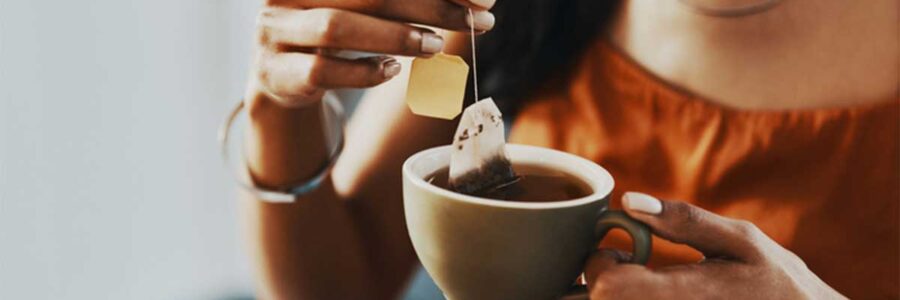Danger Lurking in Your Tea: Whether you enjoy tea for its health benefits or just because you like the taste, it’s important to know the potential dangers of microplastics in tea bags. Microplastics are tiny pieces of plastic less than 5mm long that can come from various sources, including plastic-based glue used to seal paper tea bags and actual plastic tea bags.
Microplastics and Health
Exposure to these microplastics can lead to various health problems, including reproductive and cognitive impairment, neurodevelopment disorders, oxidative stress, DNA damage, and inflammation. Chronic inflammation can occur when exposure to stressors like microplastics is constant, which can have significant health consequences over time.
Unfortunately, many popular tea brands use plastic-based materials in their tea bags, which can release billions of microplastics and nanoplastics into your tea when steeped at a brewing temperature.
Brands to Avoid:
Some of the brands you should avoid include Rishi, Jade Leaf, Shangri La, Lullaby, Tea Forte, ASDA, Aldi own brand, Asda own brand, Lidl own brand, Tesco own brand, Twinings (3 Organic blends), Waitrose own brand of decaf, Marks & Spencer, Morissons, Tetley, Waitrose, Tazo, Teavana (Starbucks), Celestial Seasonings, Mighty Leaf Teas.
Safe Bets:
Fortunately, there are plenty of tea companies that do not use plastic-based materials in their tea bags, including Abel & Cole own brand, Clipper, Co-op own brand 99, PG Tips, Pukka Herbs, Sainsbury’s own brand, Teapigs, Twinings (Organic Pure Camomile, Organic Pure Peppermint & Organic Fairtrade English Breakfast), Waitrose own-brand caffeinated tea bags, Organic India, Bird & Blend Tea, Brew Tea, Eteaket, Good & Proper, Hampstead Tea, Neal’s Yard, Nemi, PG Tops, Roqberry, Suki Tea, T2, Tick Tock Tea, Twist Teas, Yorkshire Tea, Traditional Medicinals, Numi Teas, Republic of Tea, Stash, Yogi Tea.
To reduce your exposure to microplastics, consider switching to plastic-free tea bags or using a reusable pod with loose-leaf tea. Loose-leaf tea is often less expensive than individual tea bags, and you can steep the herbs directly in hot water or use a stainless-steel reusable tea bag.
If you’ve been drinking tea with plastic-containing tea bags for a while, you may also want to consider a microplastic detox. This involves supporting your body’s elimination pathways to rid your body of the accumulated plastics. Some ways to do this include exercising to sweat, drinking enough water, ensuring regular elimination, and filtering your water.
CytoDetox®
In nature, clinoptilolite zeolites are natural minerals formed by fossilized volcanic ash and seawater. With molecular clinoptilolite fragments small enough to penetrate cells and the blood-brain barrier, CytoDetox supports the body’s natural detoxification process.
With CytoDetox, you can reduce the impact of past contaminants in your body, like heavy metals. It also ensures that as you continue to expose yourself to new toxic stressors, the proverbial rain bucket is being emptied.
Toxic substances cannot be avoided in all their forms. Therefore, we must accept that living in a modern world means being exposed to the stress of toxins. Fortunately, we can help our bodies detoxify by supporting their pathways.
Conclusion:
In conclusion, the dangers of microplastics in tea are real, but by making a few simple changes to your tea-drinking habits, you can reduce your exposure and protect your health. Choose tea brands that use plastic-free materials in their tea bags, consider loose-leaf tea, and support your body’s natural elimination pathways to eliminate any accumulated microplastics.
References:
- US Department of Commerce, National Oceanic, and Atmospheric Administration. “What Are Microplastics?” NOAA’s National Ocean Service, 13 Apr. 2016, oceanservice.noaa.gov/facts/microplastics.html.
- “Health Effects of Microplastics & Pathogens.” Plastic Health Coalition, 2 Mar. 2022, www.plastichealthcoalition.org/microplastics/.
- “Plastics and Human Health: Plastics and the Environment Series.” Geneva Environment Network, www.genevaenvironmentnetwork.org/resources/updates/plastics-and-health/.
- “Chronic Pain: What Is It, Causes, Symptoms & Treatment.” Cleveland Clinic, my.clevelandclinic.org/health/diseases/4798-chronic-pain.
- “Some Plastic with Your Tea?” McGill University Newsroom, 31 Jan. 2020, www.mcgill.ca/newsroom/channels/news/some-plastic-your-tea-300919.
- Hernandez, Laura M., et al. “Plastic Teabags Release Billions of Microparticles and Nanoparticles into Tea.” Environmental Science & Technology, vol. 53, no. 21, 2019, pp. 12300–12310., doi:10.1021/acs.est.9b02540.


